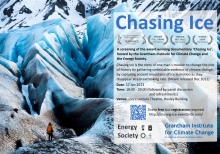Chasing Ice - capturing the disappearance of glaciers

A report from the Chasing Ice screening and panel discussion hosted by the Grantham Institute for Climate Change and Imperial College Energy Society
On the evening of Thursday 17 January 2013, Clore Lecture theatre in Huxley became “Clore Cinema” for a couple of hours. The reason: Imperial College Energy Society and the Grantham Institute for Climate Change were hosting a screening of the new multi-award winning documentary ‘Chasing Ice’. The red carpet was laid out and attendees treated to popcorn for a real cinema experience. “Clore cinema” was filled with some 280 people from college, Imperial alumni and guests.

Chasing Ice is the story of James Balog’s mission to change the tide of history by gathering undeniable evidence for climate change by capturing ancient mountains of ice in motion as they disappear at a breathtakingly fast rate. The film was released in December 2012 and has received much critical acclaim, including being shortlisted for an Oscar. The screening of the film was followed by a panel discussion on the film and climate change questions raised by it. The panel was chaired by Professor Sir Brian Hoskins, Director of the Grantham Institute for Climate Change, and was completed by Dr Tina van de Flierdt (senior lecturer in isotope geochemistry, Imperial College London) and Dr Edward King (senior glaciologist, British Antarctic Survey).

All panellists agreed with the film that the recent rate of retreat and disappearance of polar ice caps couldn’t be explained by natural processes; it is yet more evidence of the scientific consensus that climate change is man-made. Dr King and Dr Flierdt also agreed that, although a few glaciers have grown recently, an overwhelmingly large number have either receded to historically low levels and some have vanished as shown in the film.
Professor Sir Brian Hoskins commented that developing nations are suffering more from the unpredictable extreme weather events that are resulting from climate change. There was large consensus from the audience that they all wanted to do more to raise awareness of climate change.
At the networking reception that followed one audience member commented, “The film was very effective at conveying the urgency at which we must act to prevent any further damage. Seeing an entire glacier being destroyed before your eyes is a compelling sight, one that should let us all ponder on the consequences of our actions.”

Another attendee, an MSc student from the Centre for Environmental Policy here at Imperial, commented “Chasing ice was a visually stunning and emotionally compelling film that highlighted the need for everyone in the fight against climate change. It’s not just down to the politicians and powerful oil executives – this film showed that with imagination, talent and dedication, one man can communicate the whole issue in an exciting and impactful way. Despite that, the highlight for me was the audience discussion after! Debates between students and ex oil execs; stories about surviving Antarctic winters and personal perspectives on climate issues. Best of all free popcorn to enjoy as it all unfolded – better than any night at the cinema!”
Reporter: Energy team
Article text (excluding photos or graphics) © Imperial College London.
Photos and graphics subject to third party copyright used with permission or © Imperial College London.
Reporter
Press Office
Communications and Public Affairs
- Email: press.office@imperial.ac.uk
